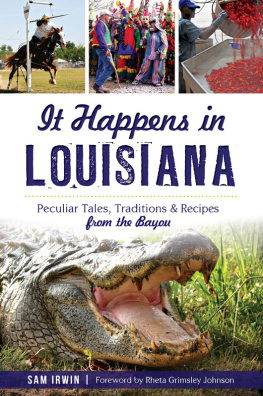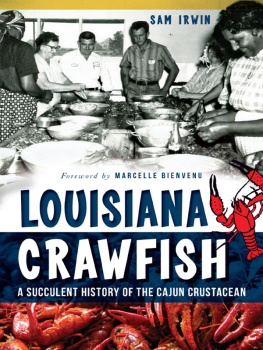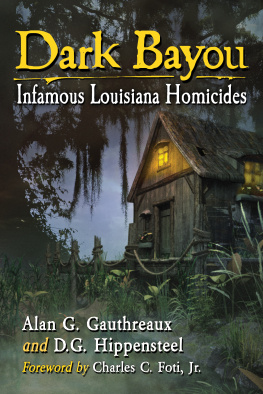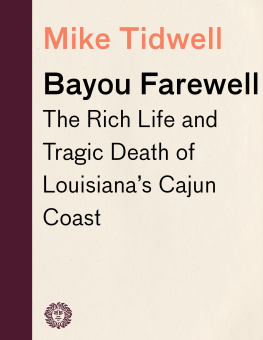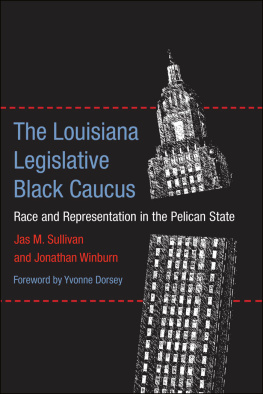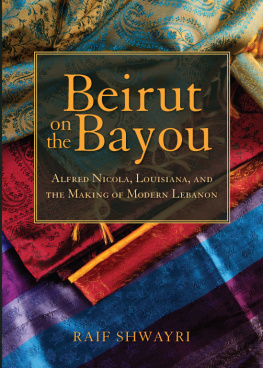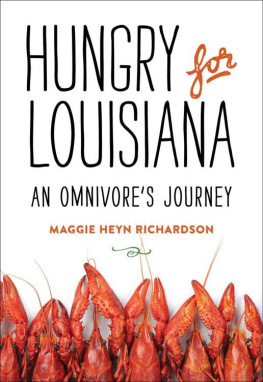

Published by The History Press
Charleston, SC
www.historypress.net
Copyright 2015 by Sam Irwin
All rights reserved
Cover photos by Sam Irwin; map by Gene Hansen and Sam Irwin.
First published 2015
e-book edition 2015
ISBN: 978.1.62585.606.7
Library of Congress Control Number: 2015947035
print edition ISBN 978.1.46711.871.2
Notice: The information in this book is true and complete to the best of our knowledge. It is offered without guarantee on the part of the author or The History Press. The author and The History Press disclaim all liability in connection with the use of this book.
All rights reserved. No part of this book may be reproduced or transmitted in any form whatsoever without prior written permission from the publisher except in the case of brief quotations embodied in critical articles and reviews.
For my grandmother Mathilde Brasseaux Amy; my mother, Mary Grace Amy Irwin; and all the Cajuns, Creoles and Louisiana residents who make Louisiana such an interesting place to live. By the way, pronounce Amy Cajun-style, that is, Ah-me.
Contents
Quoi Cest Ton Nom? (What Is Your Name?):
Bayou State Names and Nicknames
Acknowledgements
Behind every author there are lots of people who keep him going forward. Those who pointed me in the right direction include the entire history department of the University of Louisiana at Lafayette between the years 1972 and 78. They gave me a firm direction. Dr. Jim Dormon, even though he is retired and should be painting landscapes by the seashore, gave me great encouragement during the writing of this small history. Also my major professor, Dr. Gloria K. Fiero, who is painting seascapes at the seashore, taught me that OK just wasnt good enough. Also to professors John Cameron and Hal Peterson: Oh, historiographynow I understand. David Cheramie from down the bayou gave freely of his time to make sure my French spellings were correct. My wife, Betty Ruth Dupont of Iberville Parish, and my Jack Russel, Dee, Slayer of Squirrels, told me when to eat and when to go to bed, a very important service during book writing. Finally, to my ruthless fellow writer/editors, Emily Beck Cogburn and Robyn Byrd Underwood, thanks for telling me what was good and what was bad.
Foreword
Every Man a King
The other day, a friend gave me a copy of Randy Newmans classic Good Old Boys album. I had loaned or lost my own, maybe even worn it out. I wasted no time putting the new CD in my rotation.
As I listened to Newman sing the only song on the album he had not writtenEvery Man a King by Huey P. Long and Castro CarazoI thought about the lyrics in a new way. Even if Hueys socialist vision never came true for Louisiana, you could argue, by God, every man in Louisiana is a king. By virtue of the states colorful citizens and socially fearless attitudes and wildly eccentric habits, every citizen who cares one whit about leading not just a normal life but an entertaining one as well is in the catbird seat. They are sure-fire candidates to live life royallyking of frivolity, queen of flamboyance.
I love Louisiana because of its natural attributesthe Atchafalaya Swamp with its bridal veil morning mist and the graceful but sturdy live oaks strewn with Spanish moss, a spooky witchs mane that is neither Spanish nor moss. I love the idea if not the reality of the states critters, gators and hot pink roseate spoonbills and all the creeping and crawling things tourists write home about. I love its music, from the Hayride that nurtured Hank to the jazz clubs on funky Frenchman Street in New Orleans. I love Louisianas passion for food, high church and low, countless family meat markets and Sunday barbecue menus and fistfights over the best gumbo recipe, not to mention the bread pudding souffl at Commanders Palace.
More than anything, I love Louisiana people, not just the Disney Cajuns the entire nation has come to enjoy on reality television shows, but the regular folk who go resolutely about their daily business same as anywhere else, except with a certain flair, that je ne sais quoi residents of other states envy and lack.
As a reporter, I have learned to appreciate the unique, the perfectly imperfect. Because of the Bayou States amazing people, Id never visited professionally without coming away with a good story. It might be one about an alligators funeral in Ponchatoula, a geriatric stripper on Bourbon Street, an Angola prison rodeo or a gubernatorial race featuring a former Klansman versus a well-known shady politicianVote for the Crook; Its Important. Whatever else it was, it was interesting.
On Good Friday five years ago, I was sitting in the deep shade on a picnic blanket in the yard of my good friend Greg Guirard, a celebrated swamp photographer who also is a crawfisherman, writer, environmental crusader, salvager of sinker cypress and host of Pie Day in the Henderson, Louisiana area. A throng of friends had contributed pies to his annual affairsweet pies, crawfish pies, fruit piesanything but meat pies since meat is forbidden until nightfall on Good Friday. Pie Day is a centuries-old Catholic tradition that has been forgotten in France and nearly forgotten in Louisiana.
Greg, who is not religious, keeps it up because his late mother used to host a local Pie Day. He cant bear to see the tradition die.
I think that is why Sam Irwin is writing here with such eloquence and authority. He experienced all these things, and he doesnt want to see them die. As developers divide up the sugarcane fields, as Cajun French disappears with the younger generations, as places that used to be hard to get to become accessible, Sam doesnt want to see something good die.
I once had a home near little Amys (pronounced Ah-me) Grocery in workaday Henderson. By the time I lived in Henderson, Amys had been reduced to mostly beer and cigarettes. But once it was a real grocery store in a town that knows its groceries and was owned by Sams grandfather. His family members also were pioneers in the crawfish industry. Sam Irwin is what I call bona fide.
When Sam writes of accordion maker Marc Savoy, the moral is clear: its OK to be what you arenot only to be, but also to celebrate what you are.
This lively and informative book celebrates Louisiana the way only a native and keen observer can. And the recipes are lagniappe.
Rheta Grimsley Johnson
Author of Poor Mans Provence: Finding Myself in Cajun Louisiana
Quoi Cest Ton Nom? (What Is Your Name?)
Bayou State Names and Nicknames
Cajuns are cool. Ragin Cajuns is the nickname of the athletic and academic teams of the University of Louisiana at Lafayette. It is the coolest name in college sports. The Ragin Cajuns were voted as the best collegiate team nickname by the Sporting News in 1998 and an ESPN survey in 2006.
Today, if you say youre a Cajun, then youre a Cajun. Even if your name is Smith, but you were born in Louisiana, you probably have some Cajun ancestry in your family. And thats good, or as Cajuns say, a cest bon.
What, exactly, is a Cajun? The word is derived from Acadien, pronounced ah-cod-yen, to cod-yen to Cajun. The narrowest definition is a Louisiana resident descended from the French colonists who settled Acadia and the other Maritime Provinces of Canada between the years 1632 and 54 and later settled in Louisiana.
Its ironic that these Catholic colonists escaped to the Canadian colony from the religious wars that plagued their homes in Anjou and the Centre-Ouest provinces of Poitou, Aunis, Angoumois and Saintonge only to find themselves pawns in the middle of a political power struggle between France and England. Control of Acadia changed hands several times from 1647 to 1755 as a result of the Second Dutch War, King Williams War, Queen Anns War and King Georges War. As the French and Indian War began, the British deported the Acadians because they refused to swear allegiance to the English Crown.
Next page
